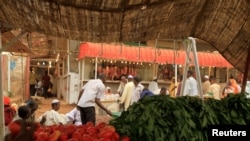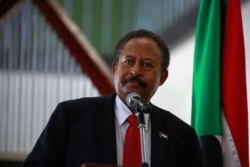Sudan’s transitional government must start moving quickly on tough, economic reforms to stabilize the economy if it wants to benefit from pledges of support offered by its international partners, said one U.S.-based analyst.
On Thursday, the United Kingdom’s Secretary of State Dominic Raab said the UK would provide a $453 million bridge loan to help Sudan clear its arrears with the Africa Development Bank. While visiting Khartoum last week, Raab also agreed Britain will provide $54 million to support the Sudan Family program, which provides cash transfers to poor Sudanese families trying to stay afloat during the economic crisis.
After meeting with the head of Sudan’s Sovereign Council, General Abdelfattah Al Burhan, and Prime Minister Abdalla Hamdok, Raab praised Sudan for enacting civil and legal reforms, adding the UK is putting its “development capabilities behind the ambitions of the Sudanese people and the next generation.”
Stabilizing Exchange Rates
Suliman Baldo, an advisor at The Sentry, a U.S.-based investigative and policy team that reports on dirty money and conflicts in Africa, said all of Sudan’s partners are emphasizing the need for the government to conduct serious economic reforms, especially now that Sudan removed subsidies on fuel.
“The next step is to harmonize the rate of exchange of the local currency to the dollar,” Baldo told VOA’s South Sudan in Focus, noting that there are “multiple rates of exchange.”
Sudan’s official exchange rate is 55 Sudanese pounds to the dollar, but on the black market, one dollar exchanges for anywhere between 260 and 280 Sudanese Pounds.
Baldo said the varying exchange rates make donors reluctant to inject money into Sudan’s economy because they fear their donations would depreciate as soon as the money is handed over.
“There’s a lot of good will, there’s a lot of pledges by multiple friends of Sudan. However, this necessity for serious reforms, however painful, is holding contributions from flowing to Sudan, so these pledges have yet to be honored by many of those who made them in the Berlin conference last year for instance,” Baldo told VOA.
At the Berlin Conference, or Sudan Partnership Conference, donors pledged $1.8 billion to support Sudan’s economic and political transition but most of the pledges have yet to be honored because of Sudan’s unstable economy, according to Baldo.
Magdi Amin, a senior economic advisor in Sudan’s Ministry of Finance and Economic Planning, said Sudan has already developed a reform program that was reviewed by the International Monetary Fund and was found to be of the “highest” quality.
“It’s a very high-level or strong, serious reform program and a lot of the reforms have already been done, including fuel subsidy reform, a lot of work on anti-corruption, SOEs [state-owned enterprises], the budget. But there are some reforms still to be undertaken, one of the most important ones is unifying the exchange rate,” Amin told South Sudan in Focus.
He acknowledged Sudan has had a history of multiple exchange rates, which he said has created “distortions in the economy.”
Sudan’s Central Bank is working on a plan for “unifying the exchange rate, which would allow any investment, whether it be donor-funded or private investment or even remittances, they go through Sudan’s official channels to benefit from a higher exchange rate,” Amin told VOA.
Tax Collection
Sudan must increase its revenues said Amin, but added, “it’s really important that the policies and the processes underlying the work that the teams are doing is reformed and then technology can be applied to it.”
Amin said many reforms are ongoing such as improving the collection of Value-Added Taxes, streamlining certain rates, and removing several exemptions, which were part of the budget approved “earlier this year.”

